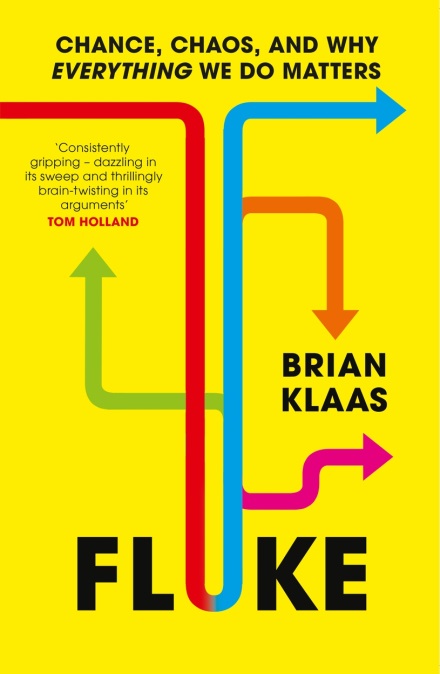One day in the early 90s I accepted the offer of a lift from a friend to a university open day I hadn’t been planning to go to. I ended up attending that university and there met my wife, and if I hadn’t done that my life would have been very different, and my children wouldn’t have been born. And this is of course true back through the chain of my ancestors – back hundreds of generations: each of them had to meet in order for me to be here.
Brian Klaas’s Fluke is all about the millions of contingent coincidences that make up our lives, and poses the question: “If you could rewind your life to the very beginning and then press play, would everything turn out the same?”
He then takes a journey through the ways in which life is, in Borges’ metaphor, a “Garden of Forking Paths”, demonstrating the disproportionate impact of small events that make chaos theory, the difficulty – indeed impossibility – of prediction, from weather forecasting to economic forecasting, and why when something happens is as important as what happens. He finds his answers in a multi-disciplinary survey of political science, philosophy, economics, evolutionary biology, geology and more, synthesising and juxtaposing winningly.
 Lots of the material is quite familiar – and I am just a general reader with no expertise in any of these fields – but it is engagingly written and Klaas has a nice way of broadening out anecdotes to make wider points. (In that respect it reminded me of a Tim Harford podcast.) Some of these stories are quite gripping – I found the section on the long-running experiment growing microbes in a test-tube, which might help reveal if the world is “contingent” or “convergent”, compelling. Others missed the mark for me, like the baffling “marble on a paper cone” analogy. But there are more hits than misses.
Lots of the material is quite familiar – and I am just a general reader with no expertise in any of these fields – but it is engagingly written and Klaas has a nice way of broadening out anecdotes to make wider points. (In that respect it reminded me of a Tim Harford podcast.) Some of these stories are quite gripping – I found the section on the long-running experiment growing microbes in a test-tube, which might help reveal if the world is “contingent” or “convergent”, compelling. Others missed the mark for me, like the baffling “marble on a paper cone” analogy. But there are more hits than misses.
The cover blurbs promise big. Fluke “won’t just shift your paradigm, it’ll detonate it.” The book “will make you rethink everything you have ever done.” Well, no, it didn’t, and no it didn’t. The over-claiming doesn’t help what is an enjoyable read, but not a book that shattered my world. That said, the big chapter on whether the world is “deterministic” – running like clockwork from the moment of the Big Bang – or not is absorbing, if again something surely we have all thought about. As Douglas Adams put it: “Does it really, cosmically speaking, matter if I don't get up and go to work?”
I’m not going to reveal what conclusions Klaas comes to, apart from to say some will agree and some disagree. His final chapter, “Why everything we do matters”, is thoughtful and almost poetically expressed, and has some sound life advice, but feels like an attempt at reassurance after several chapters pulling the rug out from under us. Ultimately, his message called to mind another Douglas Adams line, in which protesters against the revealing of the Great Answer to Life, the Universe and Everything demand “rigidly defined areas of doubt and uncertainty”. And for Klaas, this is the point: “all of us bob… on a sea of uncertainty, even when it appears to us that we’re swimming in a straight line,” so “close this book, and go out to explore that wonderful, maddening, infinitely complex world that we call home.”
- Fluke: Chance, Chaos, and How Everything We Do Matters by Brian Klaas (John Murray Press, £20)
- More book reviews on theartsdesk















Add comment